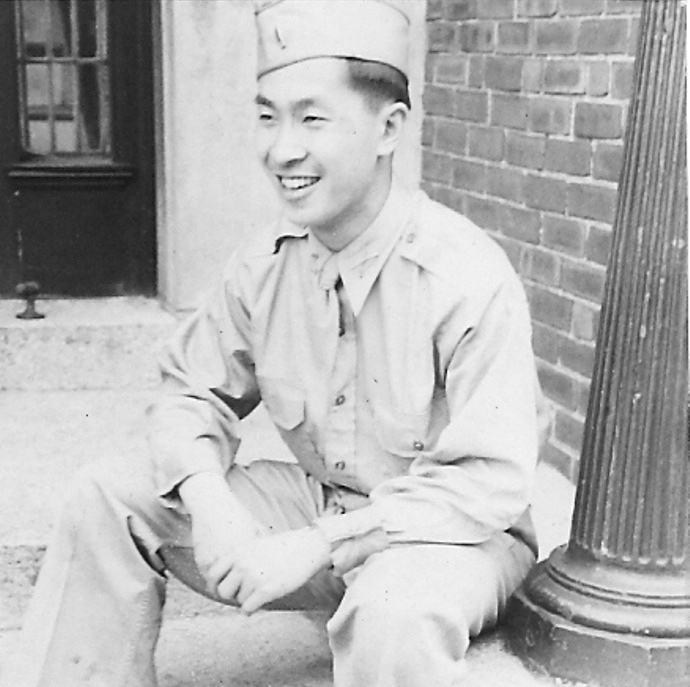Ben Fong
Ben Fong moved to Los Angeles as a teenager from Sacramento.

About
Written by Annie Luong
Ben Fong was born in December 1921 in Sacramento, California. There, his father was a partner in a wholesale and retail meat market on the main city business street, Kay Street. His father had a skin allergy in 1936, and the family moved to the East Adams area in Los Angeles.
When the Japanese bombed Pearl Harbor, Fong tried to join the U.S. Marines, but was told, “only whites were accepted.” At that point in time, he was a freshman at UCLA and was in the Infantry ROTC Program. In January 1942, the draft law changed from age 21 to 18. By July 1st, Fong was drafted into the army and sent to Fort McArthur. After several tests, he was sent to the infantry-training center at Camp Roberts for basic training.
After three months of basic training, Fong had his final Classified Secret interview. He recalls, “instead of five officers, there was a major and six captains, seven of them. And then after the interview, the major looked to his left and they all nodded, and then looked to his right and they all nodded.” Fong was given the choice: go to the infantry school in Fort Benning, Georgia; go to North Africa; or go to the South Pacific as a replacement. He chose infantry school.
In infantry school, Fong recalls the general saying, “Your job is to train and lead men into battle and there will be casualties…you can leave at any time when you figure this is not for you.” By the end of the infantry school, only one hundred and eighty graduated out of the original two hundred and sixty. After graduation, Fong was assigned to Camp Ritchie, Maryland. When he went to buy a ticket at Union Station, he was told, that the location was a secret and was given a ticket to Baltimore instead.
At Camp Ritchie, the Military Intelligence Training Center for the European Theater, they trained the personnel as interrogators of Prisoners of War. Fong was assigned to take a Counter Intelligence Course, but was not able to attend after hearing the news of his younger brother’s death. After Sam’s funeral, he was assigned to help with the training at the combat section of the school. For three months he helped with weapons and field training to prepare soldiers for the service and was reassigned to this section after he completed the next Counter Intelligence Course.
In the last major operation in Okinawa in September, Fong’s detachment was sent to regroup in Quezon City in the Philippines for the invasion of Japan. From preliminary sources, they knew that the Japanese had released training manuals telling women and old men that were left in the villages were to take sharpened bamboo sticks and defend the beaches. Children were instructed to take hand grenades and dash in front of American vehicles and blow themselves up. Fong knew that they would have to kill many of the villagers so, “when the second bomb was bombed in Nagasaki, we know that we’re not going to have to do that. We’re just going to be walking in instead.”
Features
Ben Fong – Returning Home from WWII
Audio PlayerInterview with Annie Luong
Chinatown Remembered Project
May 25th, 2008.
Annie Luong: But what do you think about the GI Bill?
Ben Fong: That changed the country. Actually, changed the country, changed the world! Because that’s the first time whether a person does qualify for an education or not, they got educated, so called educated. So are the schools mushroom, you know, increase in size 10 fold.
Annie Luong: Do you know people that moved out of Chinatown after the war?
Ben Fong: Well, at that point in time, the people like are moving away, not only from Chinatown but away from Los Angeles. See, like my sister married a veteran and they went out to Monterey Park. One of the earlier residents in Monterey Park when they move out and then shortly after within a year, my parents move out from Chinatown, you know, from where we’re living here in Los Angeles up into Monterey Park. And then when my younger brother married, he moved into Alhambra for course that by that time the Korean War started. And then I got called back.
Annie Luong: Do you know what the reason was for them to move out of the area?
Ben Fong: Well, mainly because better, better accommodations, because, see, pre-war the Chinese were not allowed to buy property. See, like my father bought a house using my brother’s name. See. In fact, before the war, a lot of the Chinese, because of the discrimination and everything else, they wouldn’t even bother with a house because they figure that, they going to go back to the old country. But then when the Japanese started there, then they changed their mind.
